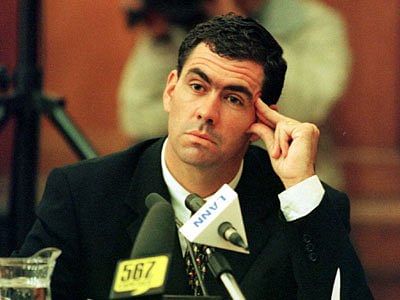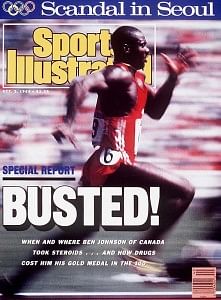
Why do sportsmen cheat?
For all those powdered-coffee product advertisements, mornings are rarely fun and games. Most households operate at breakneck speeds to carry out rehearsed routines and get people to school or work on time. If you’ve got a couple of minutes to spare, you either switch on the TV or leaf through the day’s newspaper. Now, if you’re the kind who is allergic to bad news first thing in the morning, you turn over to the ‘Sports’ page, where statistically there’s a much higher possibility of good news than any other section of the paper.
Names catch your eye instantly; sportspersons who’ve found their way into your newspaper cannot be ignored. These are the folks who’ve made it – be it victory or defeat, they are being written about; the achievers.
Then there are some who’re more than that. People who influence entire demographics simply by running faster, leaping higher or emerging stronger than their contemporaries. People who inspire by carving fairy-tales out of insurmountable odds. People who begin by being exceptional in a sport, and end up defining it.
When such people triumph, they make the world a happier place. They’re inevitably made heroes, considered a step or two above ordinary mortals. Bad news is, they’re not supposed to err like ordinary mortals henceforth. Even if they do, all is well if they don’t get caught erring.

In 2010, almost half the Pakistan cricket team were alleged to be involved in routinely fixing matches. Four players faced convictions and the credibility of Pakistan cricket dipped to new lows
Coming back to newspapers, the very sports-page that brought the frequent moment of joy has heralded quite a few worst-case scenarios in recent times. Truth comes to light turning fairy-tales into nightmares, and the rise of our heroes that inspired generations are proven farce. It is in our nature to stand by our heroes at their darkest hours, but what if our faith is only rewarded with betrayal?

Hansie Cronje had led the ascent of South African cricket from the depths of racism, and destroyed a lifetime of respect after his involvement in the infamous match-fixing scandal of 1999 came to light
There’s the Formula One team that ordered its driver to deliberately crash into a wall, there’s a globally renowned rugby player feigning injury by biting into a blood-capsule smack in the middle of a high-profile game, cricket’s most beloved captains fixing matches for a few extra bucks, there’s Lance Armstrong and his life of lies…
Why do established sportspersons, who have reserved their place in hearts and history books risk it all for just another shot at victory? Is the motto ‘Win-at-all-costs’ to be taken at such a literal level of meaning?
It’s a sad day for a sport when a player begins to believe that he can get away with cheating; that the hard-earned influence and fandom allows him to bend the rules. The worst part is most of these cheaters don’t get caught; the revelations are voluntarily made in bare-it-all autobiographies or television talk-shows. By then, however, the faith in them is so embedded and widespread, that it’s nothing less than a moral catastrophe when truth finally has its day. The bigger they are, the harder they fall.
Methods of doping have always been a step ahead of those investigating them. Ben Johnson proved that three decades ago, Armstrong has proven that now. You put a bunch of competitive people in a competitive world and there will be those willing to forego sportsmanship, if it allows them to get ahead. Integrity takes a backseat to the external rewards of glittering trophies and camera flashes.

Sports Illustrated ‘s October 3, 1988 issue about the iconic Ben Johnson’s doping revelations
And then there are those who malign the sport by messing up their personal lives. There’s the occasional Oscar Pistorius whose golden sprint in prosthetics was one of the biggest moments in the history of athletics, only to be shattered by the devastating image of the same man in handcuffs, charged with homicide. There’s a Tiger Woods, a most virtuous disciple of golf brought down by temptations of an entirely different nature. When bad things happen to people who are considered the living embodiments of a sport, the sport is ultimately the loser.
Which makes you wonder, that perhaps we – the folks watching from a distance – are as much at fault here. We pour in too much emotion into sports, which ironically is its life-blood. Why else should a budding athlete be disillusioned because his idol murdered someone – an incident that transpired not on the race track. Why does the sport of cycling and everyone associated with it feel contaminated because the greatest name among them proved to be a fraudster? Emotion drives these sportsmen to great heights, emotions lead them to their fall, and emotions let us down when we witness that fall.
Sportspersons need to take responsibility. Their coaches and support staff should make sure they do. There is only so much a sport can take before it loses credibility.
“The truly scary thing about undiscovered lies is that they have a greater capacity to diminish us than exposed ones.” ? Cheryl Hughes